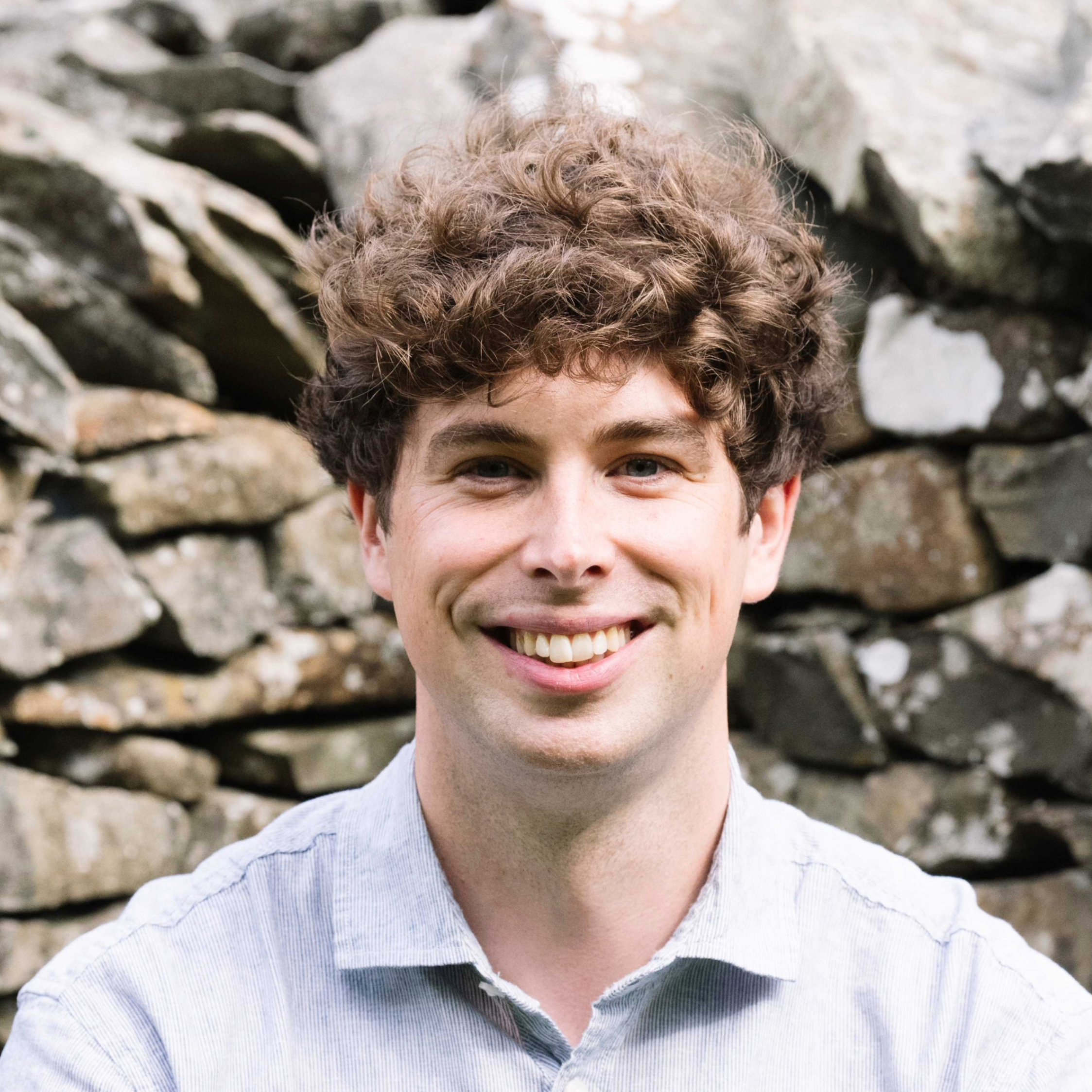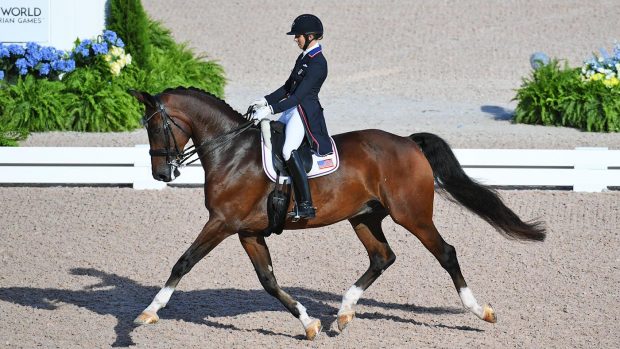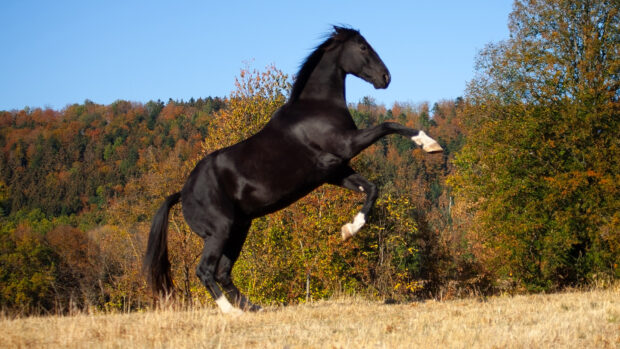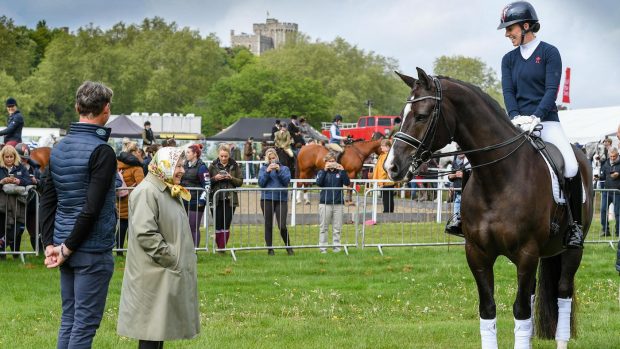Personal best scores by Fiona Howard in grade II on Diamond Dunes (80%) and Rebecca Hart in grade III on Floratina (78.57%), added to the score already set by teammate Roxanne Trunnell in grade I on Fan Tastico H, to secure team gold for the USA at the Paris Paralympics.
But even if they hadn’t won team gold, this still would’ve been the USA’s most successful Paralympics ever. Two more golds on the final day took their total tally to seven medals overall – five golds, one silver and one bronze. That absolutely smashed their previous Games best of two golds and a bronze achieved at Atlanta 1996.
It’s also only three years since they won their first-ever Paralympic team medal, with bronze in Tokyo.

Rebecca Hart (left), Fiona Howard (centre) and Roxanne Trunnell (right) atop the podium after winning team gold at the Paris Paralympics. Credit: Kevin Sparrow
Their meteoric rise over the last three Games is more than impressive – it’s unprecedented.
That’s why, once all the medals had been dished out, we spoke to the athletes and the coaches to learn the secrets behind their success, and one name kept cropping up – Michel Assouline.
Michel has been US Equestrian’s head coach for para dressage since 2017. But before that he spent 12 years as head coach to the British team who were dominant during that period.
“I think it all comes from Michel,” said Roxanne following her team test. “He got us into shape, and all his experience has helped us.”
Fiona agrees, adding that their programme has been revamped since the 2016 Games in Rio.
“He’s been wonderful in developing our athletes and our infrastructure,” she explained. “We’ve always had talented people, it’s just a matter of structuring our programmes so we can get the best out of everyone.
“It’s also his belief in us, he’s always like ‘You can do this’, and I think that’s such a great quality to have in a coach and it’s passed on through our whole team. We all support each other, and we push each other, and we’re there for each other in the ups and downs.”

Roxanne Trunnell and Fan Tastico H during their grade I team test at the Paris Paralympics. Credit: FEI/Lizz Gregg
Michel explained that he’d used the experience he gained in Britain to re-develop the para dressage programme in the USA.
“When I took the job I knew we had a hard climb because when I started we were 12th in the world,” he said.
“But I like challenges, and I had done GB for so long, and winning gold after gold after gold, I thought it’s time to move on.
“It’s been a slow process, we won some medals at the World Championships in 2018, and then in Tokyo we got the team bronze – you could see that we were just inch-by-inch getting there.
“I’ve developed a completely new strategy, we had to revisit everything. I’ve had to develop a coaching programme specifically for para coaches because they didn’t have that before – as well as judges, training camps, and so on.
“I learnt a lot with ParalympicsGB, I worked really well with the world class performance director Will Connell. I was very lucky to be selected for an elite coach course with UK Sport and I’ve also got a sports degree back in France so I knew I had all the elements in my head to build a plan to give us the best chance ever.”
Michel added that as well as the long term redevelopment of the USA’s para infrastructure, he also had a shorter three-month plan specifically for the Paris Games. The team were based in Europe, competing at CPEDI3*s together at Hagen, Fontainebleau and Mannheim, with their scores climbing with each outing.
“This was important, because in the USA we’re so isolated,” Michel explained. “There are not a lot of riders over there and they were all competing against themselves, so there’s nobody else to compare with.
“I think we have maybe 18 [international] para riders in the whole country, it’s a very small pool. But I’ve always felt that they have a really good equestrian culture and there was a good base to work with.”
As well as new training programmes, the USA has been able to effectively source the horsepower needed to win medals. Just as their able-bodied counterparts did, Team USA invested in several new combinations for Paris – but with significantly more success.

Supporters watch on as Team USA win team gold at the Paris Paralympics. Credit: FEI/Liz Gregg
Roxanne and Fan Tastico H have only been together since March, the same month Fiona and now triple-gold-medallist Diamond Dunes made their international debut. Kate Shoemaker made her debut in February with Vianne, who is a former finalist at the World Breeding Championships in Ermelo, while Rebecca teamed up with Floratina – who is a former able-bodied small tour Pan American Games medallist – in 2023.
“It takes a lot of travelling to find them,” Michel explained. “To tell the truth my wife Mette – who was the one to find Athene Lindebjerg for the British team and several other Lady Joseph Trust horses – is fantastic for that, she is my strongest ally.
“She’s always travelling the world looking for horses, and when she finds one she tells me and we go to try them. But it’s not just about finding a horse, it has to be rideable and suitable for a particular grade, and she has great feel for that.
“But it still takes a long time, it’s a difficult process. Sometimes you see 10 horses and it doesn’t work – it’s like a puzzle, everything has to be exactly right.”
On whether he could be tempted back to a role in Britain to revitalise their medal chances, Michel added: “There are always hundreds of possibilities, we’ll see what the world gives.
“For me, it was a test with the USA, but I know now that what I’ve got on the books is a system that works.
“And I hope that our colleagues in Britain know that Mette would always be happy to help find horses.”
- To stay up to date with all the breaking news throughout the Paralympic Games, Burghley, Horse of the Year Show and more, subscribe to the Horse & Hound website
You might also be interested in:

‘I want another baby!’: Natasha Baker crowns her comeback with another Paris 2024 medal

‘We should all be incredibly proud’: British disappointment as USA set new record at Paris 2024

Natasha Baker and Dawn Chorus mark emotional championship comeback with Paralympic medal

Subscribe to Horse & Hound magazine today – and enjoy unlimited website access all year round






